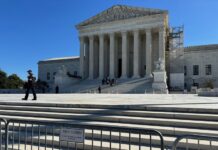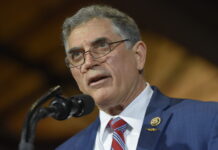
(GA Recorder) — Georgia college students can continue to bring their handguns to class after the Supreme Court of Georgia upheld a lower court’s decision to dismiss a challenge to the state’s campus carry law from a group of five professors.
The law, which went into effect in 2017, requires the university system’s 26 universities to allow lawful gun owners to carry concealed handguns at school buildings with a few exceptions, such as in on-campus childcare centers, in classes in which high school students are enrolled or in administrative offices where disciplinary proceedings are held. Last year’s constitutional carry law further eliminated license requirements to carry in colleges and elsewhere.
The law was controversial when created. Former Republican Gov. Nathan Deal vetoed a version of the law in 2016 before signing another version with more exceptions the following year. After that, the Board of Regents, which oversees the state’s public universities, changed its policy to comply with the law.
The five professors behind the lawsuit said being forced to allow guns into their classrooms puts them at risk. Some said they run laboratories with chemicals or machinery that could be extremely dangerous if damaged by a firearm.
They argued that Georgia universities disallowed guns on campuses for over two centuries, and the Legislature overstepped its bounds by changing their rules.
But in a unanimous ruling, the justices found that the Board of Regents adopted the rule change on their own initiative, and it was the Regents’ policy, not anything that passed the Legislature, that resulted in the alleged harms the professors hoped to redress.
“In determining that this action by the Board moots the professors’ challenge to the 2017 amendment, we do not concern ourselves with why the Board took this action,” wrote Justice John J. Ellington in Tuesday’s decision. “We do not look behind the exercise of government power to determine the subjective reasons—legal, political, or otherwise—for a particular action, so long as the action was within the government actor’s authority.”
Ellington added that doing as the professors asked and declaring that the campus carry law constituted a separation of powers violation would not have eliminated the issues caused by the university system’s gun policy.
Matthew Boedy, a professor at the University of North Georgia and state chapter president of the American Association of University Professors, said the ruling reaffirms the independence of Georgia’s higher education system, and he hopes the Regents will use that independence to re-ban firearms.
“While the law allowing guns on campus was supported by a GOP-led legislature and signed by a GOP governor, the court made clear it was actions by the Board of Regents in revising its own policy that pushed this dangerous law on students, faculty, and staff,” Boedy said. “The court then implied the Regents can act independently and ban guns from campus. The Regents should do so. I applaud the professors for standing up for the safety of all on campus. I continue to ask the Regents to do the same. Guns on campus are an affront to education.”







